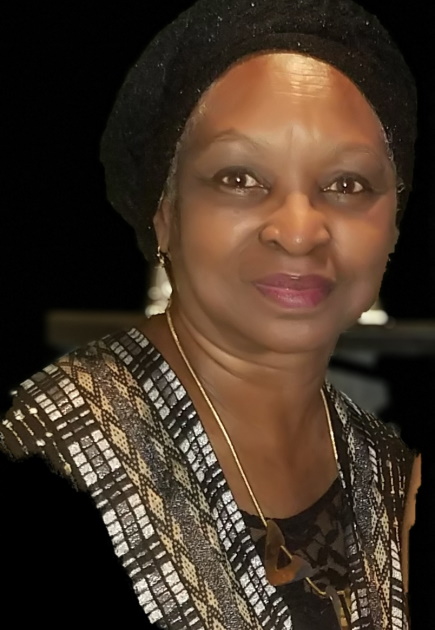A Warrior at Heart: Detroit activist partners with the School of Social Work researchers for community good
Community and senior activist Dell Stubblefield is often called upon to lend a hand—a call she always answers enthusiastically. Stubblefield is a Community Engagement Specialist with HOPE Village Revitalization, a non-profit in HOPE Village, a 100-block community in the Focus: HOPE area. Her areas of interest include environmental issues and community gardening.
 Recently, Stubblefield was named to Hannan Center’s ’70 over Seventy Class of 2022,’ an annual award honoring 70 “exceptional older adults who prove impact is ageless.” Hannan Center’s mission is to preserve the dignity and enhance the quality of life of seniors in Michigan.
Recently, Stubblefield was named to Hannan Center’s ’70 over Seventy Class of 2022,’ an annual award honoring 70 “exceptional older adults who prove impact is ageless.” Hannan Center’s mission is to preserve the dignity and enhance the quality of life of seniors in Michigan.
“When I was told I was nominated for my civic and community leadership, I was surprised beyond words. It was unexpected, but much appreciated,” she said.
Stubblefield attended a special ceremony and brunch honoring the awardees held on Oct. 1st at the Dearborn Inn.
“I was honored to be recognized along with so many others, and on a personal level, to be recognized for maintaining a meaningful involvement in civic service.”
She was nominated for the award by Carrie Leach, research assistant professor at the Institute of Gerontology. An excerpt from Leach’s nomination letter reads: “Dell continues to shatter notions of what it means to live after seventy, as she is thriving and continuing toward her own growth and evolution. I’ve visited the local urban garden and farmers market that she helps lead, distributed hundreds of computers with her to older adults in her neighborhood to help them during the pandemic when physical distancing meant that many were unable to remain socially close. During the pandemic she shared that her neighbors didn’t have the masks they needed, so we worked together to find 1,000 and she got them distributed. Dell is an inspiring influencer and leader who helps empower others and her community to actualize in countless ways.”
Stubblefield is a familiar face at Wayne State University’s School of Social Work (SSW). The SSW often collaborates with community advocates on research projects, as part of its mission is to engage, build trust, and partner with the community on the creation of new knowledge that benefits the community. Stubblefield partnered with the SSW on several initiatives, including the Spencer Foundation funded project, Dismantling the School to Prison Pipeline in Detroit, also known as DSTOPP. DSTOPP seeks to nurture the aspirations, well-being and development of all young bright students of color endangered by the school to prison pipeline, through initiatives such as restorative justice practices in Detroit middle schools and innovative early literacy programming for children of incarcerated parents. Stubblefield worked with Social Work Professor, Richard Smith, as a member of the project’s community advisory board.
“Dell worked to develop the criteria and process to recruit and select four collaborative inquiry teams. She also participated in our orientation, research symposium and closing celebration,” said Smith.
“DSTOPP built an interdisciplinary network of community members, practitioners, and academic researchers committed to working together to advance educational justice in Hope Village and Detroit. I was proud to be a part of a team working towards positive change in our community,” said Stubblefield.
She’s currently a Deliberate Group Leader (DGL) with Deliberations for Sustainable Healthy Communities at HOPE Village Revitalization, and an advisory board member with the Center for Urban Responses to Environmental Stressors (CURES) at Wayne State. She also worked with WSU School of Medicine Oncology Professor in the Office of Cancer Health Equity and Community Engagement Hayley Thompson and WSU Karmanos Cancer Institute Research Assistant Asha Freeman on the Community Health Scholars Summer Program called CHECK-UP. In addition, Stubblefield worked on the Citizenship for Health Program with the College of Liberal Arts and Sciences History Professor Marc Kruman and Social Work Professor Emeritus Joanne Sobeck. The Citizenship for Health Program is a collaboration between Focus:HOPE's Urban Learning and Leadership Collaborative (ULLC), and WSU's Center for the Study of Citizenship, School of Social Work, and Integrative Biosciences Initiative to promote citizen empowerment and control over health disparities within communities.
"Dell is a committed member of the community and helped the Citizenship for Health Program achieve its goals of using deliberative democracy to improve the health and wellbeing of citizens," stated Sobeck.
Stubblefield’s daughter, Terri, manager of admissions and records at the SSW, has learned many valuable lessons from her mother.
“When it comes to community, my mother is a warrior and works to make sure businesses that want to be a part of the community have something to offer. She works to help people in the community be connected, because connections create strong foundations for support, guidance, and assistance. I love my mom and am so proud of all of her accomplishments,” she said.
Stubblefield was raised to help others.
“Seeing my parents’ community involvement helped to develop my interest. I’d also like to acknowledge my Deputy Director, Stephanie Johnson-Cobb, who mentored and guided me in learning about effective community involvement. My Director, Debbie Fisher, also motivates me through her examples and commitment to the community,” she said.
Speaking of examples, she hopes to leave a legacy for her daughter, grandchildren, and great-grandchildren to understand that “the value of selfless service to others is a feeling of value, and a return of gratitude and personal satisfaction.”
For me, the reward is in the giving and being of service to others. - Dell Stubblefield
Author: Laura Hipshire laurahipshire@wayne.edu